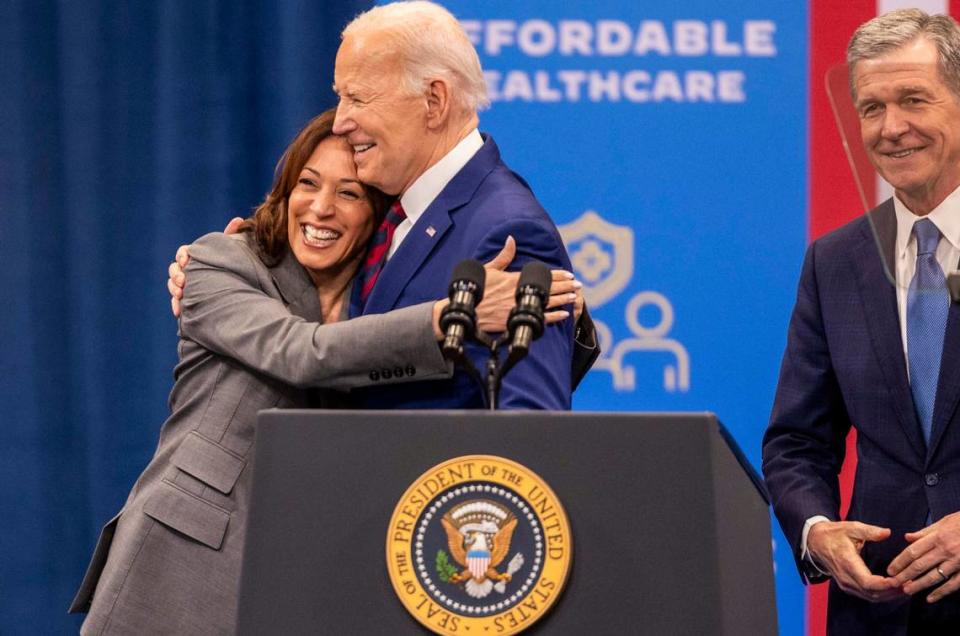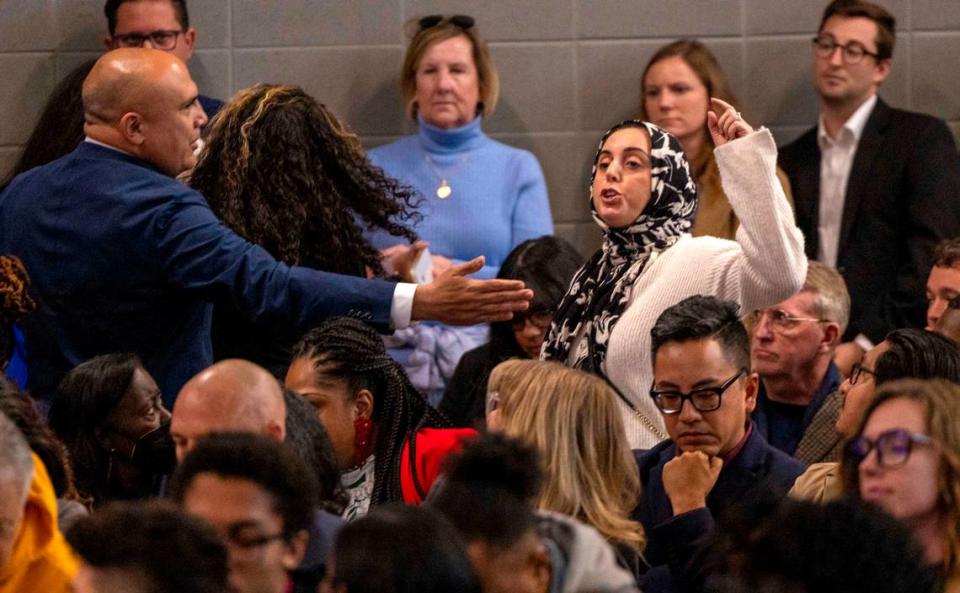In Raleigh, Biden and Harris talk health care and lowering prescription drug prices
- Oops!Something went wrong.Please try again later.
- Oops!Something went wrong.Please try again later.
- Oops!Something went wrong.Please try again later.
- Oops!Something went wrong.Please try again later.
In Raleigh Tuesday, President Joe Biden and Vice President Kamala Harris both called health care a right and contrasted their administration’s vision for affordable and accessible health care with congressional Republicans’ latest budget plan.
Biden said they came back to North Carolina to celebrate the Affordable Care Act passed under President Barack Obama and “to remind all of us, that we can’t take anything for granted.”
Biden talked about “beating Big Pharma” through the Inflation Reduction Act, and how he wants to expand the prescription price cap on insulin, which people with Type 1 diabetes need to live, beyond an exiting price cap for seniors.
The president also said that he and Harris want to restore full access to abortion, which many states have limited after the U.S. Supreme Court overturned the Roe v. Wade decision as “the law of the land.”
“I see a future with health care as a right, and we restore the freedom to choose and protect the freedoms, not take them away,” Biden said.
Biden and Harris visit to RDU, Chavis Community Center
Biden and Harris arrived at Raleigh-Durham International Airport on Tuesday afternoon via Air Force One and Air Force Two, then headed to John Chavis Memorial Park and Community Center in Raleigh on Martin Luther King Jr. Boulevard.
Durham Mayor Leonardo Williams and Morrisville Mayor T.J. Cawley greeted Biden. The president was accompanied by Gov. Roy Cooper, who had been in Washington on Monday to speak at an event.
John Chavis Memorial Park’s walking track, fields, playground and community center were closed to the public for the event. Several downtown Raleigh streets were also closed. Biden and Harris were expected to attend a private fundraiser after the event. Neither event was open to the public.
Biden’s speech began later than expected, as he departed D.C. later than planned to give an update on the Francis Scott Key Bridge collapse in Baltimore. Harris began her remarks by talking about supporting the people of Maryland, those who are missing and rebuilding the bridge.

Democratic Attorney General Josh Stein, who is running for governor, and Cooper spoke at the start of the event. Cooper touted this state expanding Medicaid this past year, which took effect about four months ago.
“It’s a very real thing. That’s thousands of people like our childcare workers, like our senior adult care workers, who can now see a doctor when they’re sick. They can get their medications without breaking the bank. And they and their families can rest a little easier at night, knowing that they’re covered,” Cooper said.
Cooper talked about how the Biden Administration has capped prescription prices, including insulin for seniors. Biden’s administration wants to expand those prescription caps to younger people as well.
Biden talked more about his insulin price cap plan during his speech.
“For example, instead of seniors with diabetes paying as much as $400 a month for their insulin they so badly need, they now only have to pay $35 a month, period... Folks, I want to extend those savings to everyone who needs life saving insulin. Whether you’re a senior or not — everyone, everyone,” he said.
‘Free Palestine’ protesters at Chavis
A group of Free Palestine protesters gathered outside Chavis Park before Biden and Harris arrived. Biden’s speech was briefly interrupted by a protester shouting about health care in Gaza.
“Everybody deserves health care,” Biden said, pausing his speech and urged “patience” as a few protesters were escorted out.
“They have to get a lot more care into Gaza,” Biden said, before turning “back to the subject at hand” and talking about health care coverage.

Biden-Harris health care ‘vision’
Harris spoke on the high maternal mortality rate in the United States in comparison to other developed countries. She said millions of women also don’t have access to postpartum care and how the Biden administration has expanded Medicaid coverage of it.
The Affordable Care Act was passed into law in 2010 under the Obama Administration. It expanded the Medicaid program, which provides health insurance to low-income individuals, added Medicare benefits and created the federal Marketplace, which provides subsidies to those who qualify to help lower health insurance costs.
In an interview with The News & Observer on Tuesday morning, White House Press Secretary Karine Jean-Pierre said that Biden and Harris
want to continue to lower prescription drugs prices.
“Americans should not have to spend thousands and thousands of dollars a month to figure out — just to live. To live. And so that’s a big part of it, that he’ll lean into prescription drugs, continuing to lower those costs,” she said.
This is one of many trips by Biden Administration members to the state in recent months, pointing to the importance of North Carolina in November’s presidential election. In this battleground state, former President Donald Trump beat Biden in 2020 by less than 2% of votes.
Biden was in Raleigh in January to talk about his administration’s latest investments in expanding high-speed internet access in the state. Harris was in Durham in March and announced federal money to help women- and minority-led businesses.
As for the GOP, Trump held a rally in Greensboro a few days before North Carolina’s presidential primary election on March 5.
Former South Carolina Gov. Nikki Haley also held a rally in March, but later dropped out of the race for president.
Republican National Committee Chairman Michael Whatley, who until recently led the NCGOP, said in a statement Tuesday that “North Carolina voters delivered the Old North State for President Trump in 2016 and 2020, and will proudly cast their ballots for him yet again this November.”
“A visit by Joe Biden and Kamala Harris will not change the fact that North Carolina families are suffering from out of control inflation, our border is wide open and the world is a more dangerous place than it was under President Trump,” Whatley said.
The GOP and Trump’s vision
The trip to North Carolina came while the White House is criticizing healthcare policies within the Republican Study Committee’s 2025 budget proposal released on Wednesday. The proposal by the RSC — which is composed of 80% of Republicans in the House, including every member of House leadership — includes changes to Medicare and Medicaid.
It also calls for raising the age to qualify for Social Security. These proposals point to the viewpoint that the GOP may take on these issues should they hold the reins next year.
Trump, the GOP’s presumptive nominee, has faced questions on his stance on healthcare following an interview with CNBC where he suggested reforming “the bad management of entitlements” such as Social Security, Medicare and Medicaid. Trump’s campaign said he was referencing “cutting waste,” and not the programs, according to The Washington Post.
A news release by the House committee’s chairman, Kevin Hern, an Oklahoma congressman, says that the RSC proposal focuses on addressing the “federal spending problem” and starting to pay down debts.
The news release says that over 10 years the plan cuts spending by $16.7 trillion and reduces taxes by $5.3 trillion. The federal deficit is projected to grow to $1.8 trillion in 2025.
Social Security and Medicare also face insolvency over the next decade, meaning these programs may not have enough money to pay full benefits promised to taxpayers.
Republican proposals
Jean-Pierre called the Biden Administration’s plan to lower health care costs, especially prescription drug prices, in “stark contrast” to Republicans’ plan.
“Republicans want to attack ACA,” she said.
Republicans’ plan includes various changes to federal programs. In terms of Social Security, the plan dubbed the “Fiscal Sanity to Save America” calls for “modest adjustments to the retirement age for future retirees to account for increases in life expectancy” and for lowering some benefits for people making more money.
The RSC plan also calls to end Medicare’s ability to negotiate drug prices and throws support behind legislation that says life begins at conception. It also supports a bill giving rights to embryos, which some say could place in-vitro fertilization on uncertain ground. This comes as the U.S. Supreme Court will take up a case on Tuesday that could impact how women get access to mifepristone, a pill used for abortions.
In terms of Medicaid and the Children’s Health Insurance Program (CHIP), which are jointly funded by the federal government and the states, the plan appears to lower federal funds allocated to states.
The Republican plan suggests implementing Medicaid block grants, through which states receive federal Medicaid funding, irrespective of states’ actual costs, according to the Georgetown University McCourt School of Public Policy. This would mean moving away from the current system under which the federal government covers a percentage of Medicaid and CHIP costs.
This would move the federal share in costs of these two programs closer to 50%, says the report. This ensures that states focus spending on “spending on mandatory benefits for vulnerable populations “ and not optional services, according to the report.
In North Carolina, the federal government currently covers about 66% of costs for the Medicaid non-expansion population and 75% under CHIP. It covers 90% of Medicaid coverage costs for the expansion population.
Medicaid expansion became law in North Carolina this past year, after an agreement between legislative GOP leaders and Cooper expanded eligibility based on income for hundreds of thousands of people.

